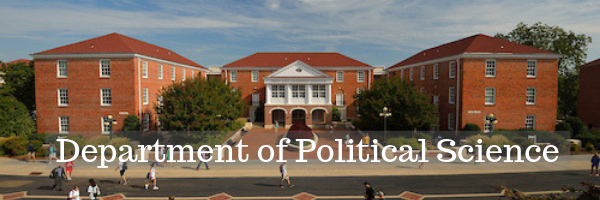
Faculty Books
Faculty in the Department of Political Science have published many books, showcased here. Purchasing information is included for books in print. This series does not provide copies of the books themselves.
-

Dimensions of Blackness: Racial Identity and Political Beliefs
Jas M. Sullivan, Jonathan Winburn, and William E. Cross Jr.
A multidimensional perspective captures the complexities of African American racial identity. While the dynamics of racial oppression limit the range of attitudes blacks may construct and hold, their basic humanity introduces additional attitudinal variance that is nearly boundless. Rather than claim it is possible to conceptualize and measure every iteration of blackness, modern social theorists such as Robert Sellers and William Cross Jr. contend that one should systematically “sample” the unmanageable range of different identity frames found among blacks. In Dimensions of Blackness, the authors suggest there is no single, solitary way to express black racial identity. They move away from blackness as binary and instead reveal what happens when black racial identity is conceptualized with “difference of opinion.” Using a multidimensional perspective this book explores whether black racial identity differences among blacks influence political attitudes and behavior.
-

Unhealthy Politics: The Battle Over Evidence-Based Medicine
Eric M. Patashnik, Alan S. Gerber, and Conor M. Dowling
The U.S. medical system is touted as the most advanced in the world, yet many common treatments are not based on sound science. Treatments can go into widespread use before they are rigorously evaluated, and every year patients are harmed because they receive too many procedures—and too few treatments that really work. Unhealthy Politics sheds new light on why the government’s response to this troubling situation has been so inadequate, and why efforts to improve the evidence base of U.S. medicine continue to cause so much political controversy and public trepidation. This critically important book draws on public opinion surveys, physician surveys, case studies, and political science models to explain how political incentives, polarization, and the misuse of professional authority have undermined efforts to tackle the medical evidence problem and curb wasteful spending. It paints a portrait of a medical industry with vast influence over which procedures and treatments get adopted, and a public burdened by the rising costs of health care yet fearful of going against “doctor’s orders.” The book shows how the government’s efforts to promote evidence-based medicine have become mired in partisan debates. It also proposes sensible solutions that can lead to better, more efficient health care for all of us. Unhealthy Politics offers vital insights not only into health policy but also into the limits of science, expertise, and professionalism as political foundations for pragmatic problem solving in American democracy.
-

Super PAC! Money Elections and Voters After Citizens United
Conor M. Dowling and Michael G. Miller
Recent federal court activity has dramatically changed the regulatory environment of campaign finance in the United States. Since 2010, the judiciary has decided that corporations and labor unions may freely spend in American elections, and that so-called "Super PACs" can accept unlimited contributions from private citizens for the purpose of buying election advertising. Despite the potential for such unregulated contributions to dramatically alter the conduct of campaigns, little is known about where Super PACs get their money, where they spend it, or how their message compares with other political groups. Moreover, we know almost nothing about whether individual citizens even notice Super PACs, or whether they distinguish between Super PAC activity and political activity by other political groups. This book addresses those questions. Using campaign finance data, election returns, advertising archives, a public opinion survey, and interviews with congressional candidates in the 2012 election, Super PAC! provides unprecedented insight into the behavior of these organizations, and how they affect public opinion and voting behavior. The first in-depth exploration of the topic, this book will make significant contributions in both political science and applied policy.
-

Teachers versus the Public: What Americans Think About Schools and How to Fix Them
Paul E. Peterson, Martin R. West, and Michael Henderson
A comprehensive exploration of 21st Century school politics, Teachers versus the Public offers the first comparison of the education policy views of both teachers and the public as a whole, and reveals a deep, broad divide between the opinions held by citizens and those who teach in the public schools. The book provides the first experimental study of public and teacher opinion. Using a recently developed research strategy, the authors ask differently worded questions about the same topic to randomly chosen segments of representative groups of citizens. This approach allows them to identify the impact on public opinion of new information on issues such as student performance and school expenditures in each respondent’s community. The changes in public opinion when citizens receive information about school performance are largest in districts that perform below the national average. Altogether, the results indicate that support for many school reforms would increase if common core state standards were established and implemented in such a way as to inform the public about the quality of their local schools. These and many other findings illuminate the distance between teacher opinions and those of the public at large.

